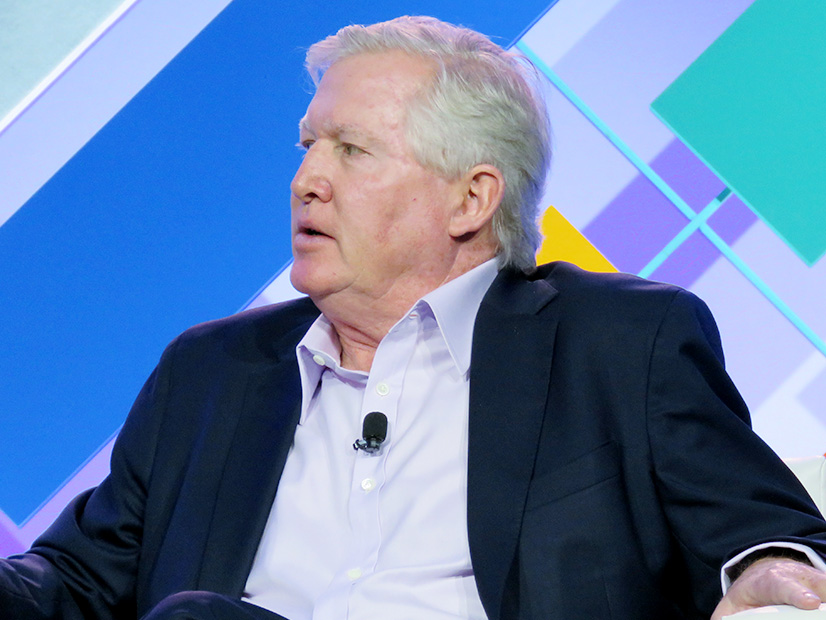Exelon (NASDAQ:EXC) said Wednesday that the proposed 15% minimum corporate income tax included in the Democrats’ energy and climate bill could impinge its cash flow and slow infrastructure investments, while PPL (NYSE:PPL) said the change would not affect it significantly.
The companies commented on the proposed Inflation Reduction Act of 2022 during their respective second-quarter earnings calls.
Exelon CEO Chris Crane praised the bill’s extended tax benefits for solar and wind and its new ones for nuclear and hydrogen, as well as its measures to support energy efficiency and electrification.
But he said the incentives could be undermined by the new minimum tax and “slow the investment needed to make this [low-carbon] transformation.”
“As currently drafted, we could see an impact of … approximately $300 million per year starting in 2023. Higher taxes would ultimately limit our ability to invest in infrastructure needed to accommodate the clean energy our customers want,” Crane said, adding that the company and its trade group, the Edison Electric Institute, is lobbying for “language that better aligns incentives to achieve” decarbonization.
CFO Joseph Nigro declined to say whether the alternative minimum tax (AMT) would increase the company’s equity needs, saying the company would determine a response during its end-of-year planning. “It’s unclear at this point how these taxes will flow through to our customers,” Nigro said.
The company reiterated its previously announced plans to raise $1 billion in equity by 2025, half of it this year, in part to pay down short-term debt from the Feb. 2 spinoff of Constellation Energy (NASDAQ GS:CEG), its former generation unit.
Crane said the company could resort to cost cutting and adjusting project schedules to maintain its capital spending plans and earnings metrics despite the tax.
“There’s a few balls in the air that we’ll have to … juggle. But we’d rather have the fix to the bill so we’re not having to juggle this,” Crane said. “We’ll see how we prevail as an industry as we go forward.”
No Unity
The industry does not appear united on the minimum tax, however.
At PPL’s earnings call later Wednesday, company officials said they did not expect the AMT to have a material impact.
“As you know, we are now a federal cash taxpayer,” CEO Vincent Sorgi said in response to an analyst’s question. “So, we’re not anticipating the 15% AMT provision to have a significant impact on our business. … No real headwind there.”
CFO Joe Bergstein said the company’s effective tax rate is currently about 15%.
 PPL CEO Vincent Sorgi | PPL
PPL CEO Vincent Sorgi | PPLSorgi said the IRA is a net positive for PPL, particularly as it looks to replace 1,000 MW of coal-fired generation in Kentucky by 2028 and meet Rhode Island’s newly enacted 2033 target for 100% renewable energy. In a solicitation that closes in mid-August, PPL’s Kentucky utilities said they would consider replacing the coal generation with renewables, battery storage, and peaking or baseload natural gas. PPL completed the acquisition of Rhode Island Energy in May.
“The ability to elect the production tax credit instead of the [investment tax credit] for solar will improve the economics of our self-build options as we look at renewables as a potential source of replacement generation in Kentucky,” Sorgi said. “In addition, the extension of the renewable tax credits should lower the cost of renewables overall. …
“The transferability provisions around tax credits also makes it more likely that renewables will be built,” he added. “And that’ll also be good in general for the industry and for accelerating our clean energy transition. It simplifies the structure of the deals significantly.”
EEI told RTO Insider on Wednesday that it welcomed the bill’s “robust clean energy tax package.”
But Eric Grey, EEI’s vice president of government relations, did not directly respond when asked whether the group was seeking changes to the AMT.
“As always, EEI continues to be a resource for policymakers seeking feedback on how provisions in this legislation would impact electric companies and their customers during implementation,” Grey said in a statement.
PPL said EPA’s proposed “good neighbor” rule, expected to take effect late 2022 or early 2023, could require shifting the retirement of an additional 500 MW of coal generation from a planned 2034 shutdown to the “2026 to 2028 time frame.”
The rule would require EPA and states to address interstate transport of air pollution that affects downwind states’ ability to attain National Ambient Air Quality Standards. Based on the final rule, PPL will determine whether to retire the plant or invest in “back-end technology” to keep it operating until 2034, Sorgi said.
Earnings Results
Exelon reported GAAP net income from continuing operations of $962 million ($0.47/share) for the second quarter, up from $808 million ($0.33/share) a year earlier. Adjusted (non-GAAP) operating earnings were $935 million ($0.44/share), up from $842 million ($0.36/share).
Nigro said 2021’s second quarter reflects a 9-cents/share impact for corporate overhead costs that were previously allocated to the company’s generation segment and were required by accounting rules to be presented as part of Exelon’s continuing operations. “These costs were paid for by generation and are not indicative of our corporate overhead post-separation,” he said.
PPL’s second-quarter GAAP earnings were $119 million ($0.16/share) versus $19 million ($0.03/share) in 2021. Non-GAAP earnings from continuing operations were $222 million ($0.30/share), compared with $147 million ($0.19/share) the year before.


